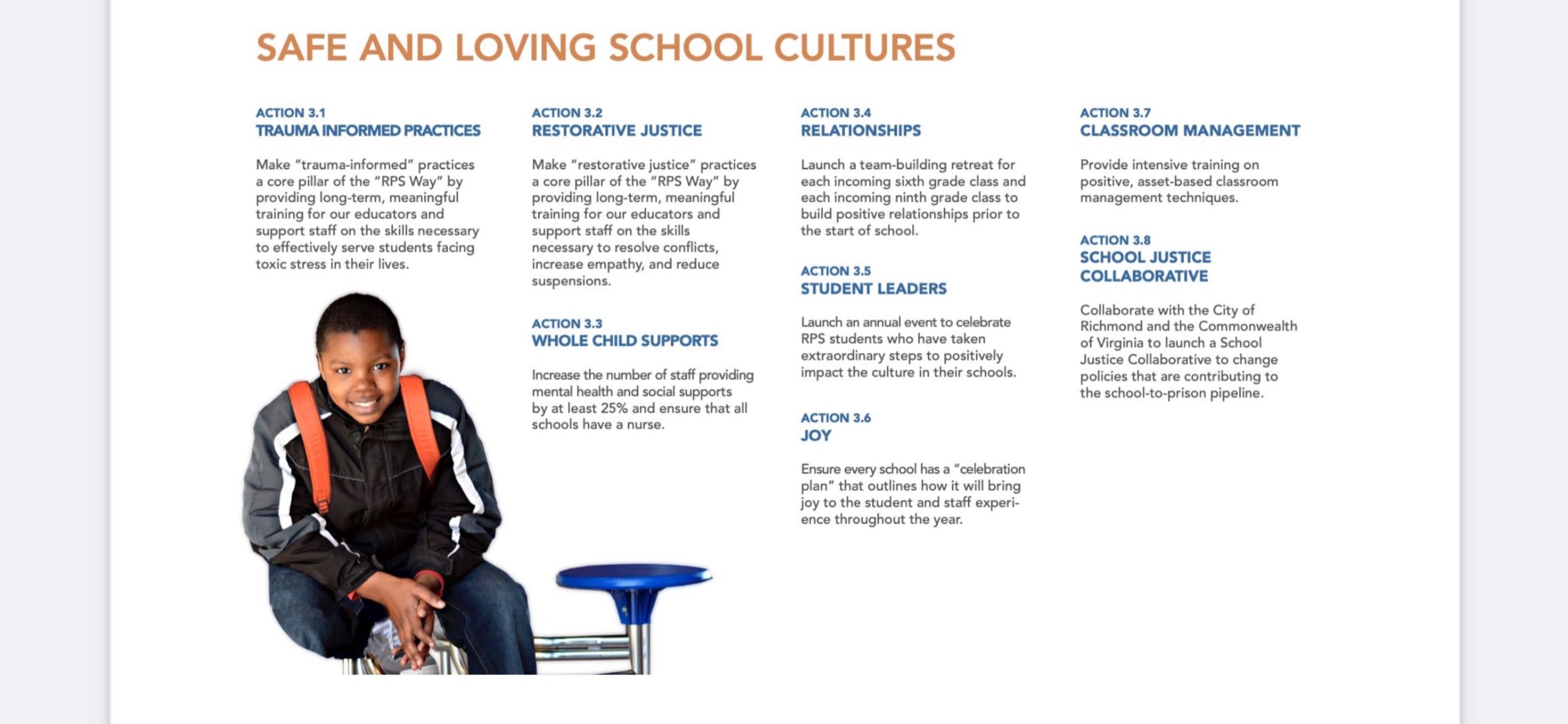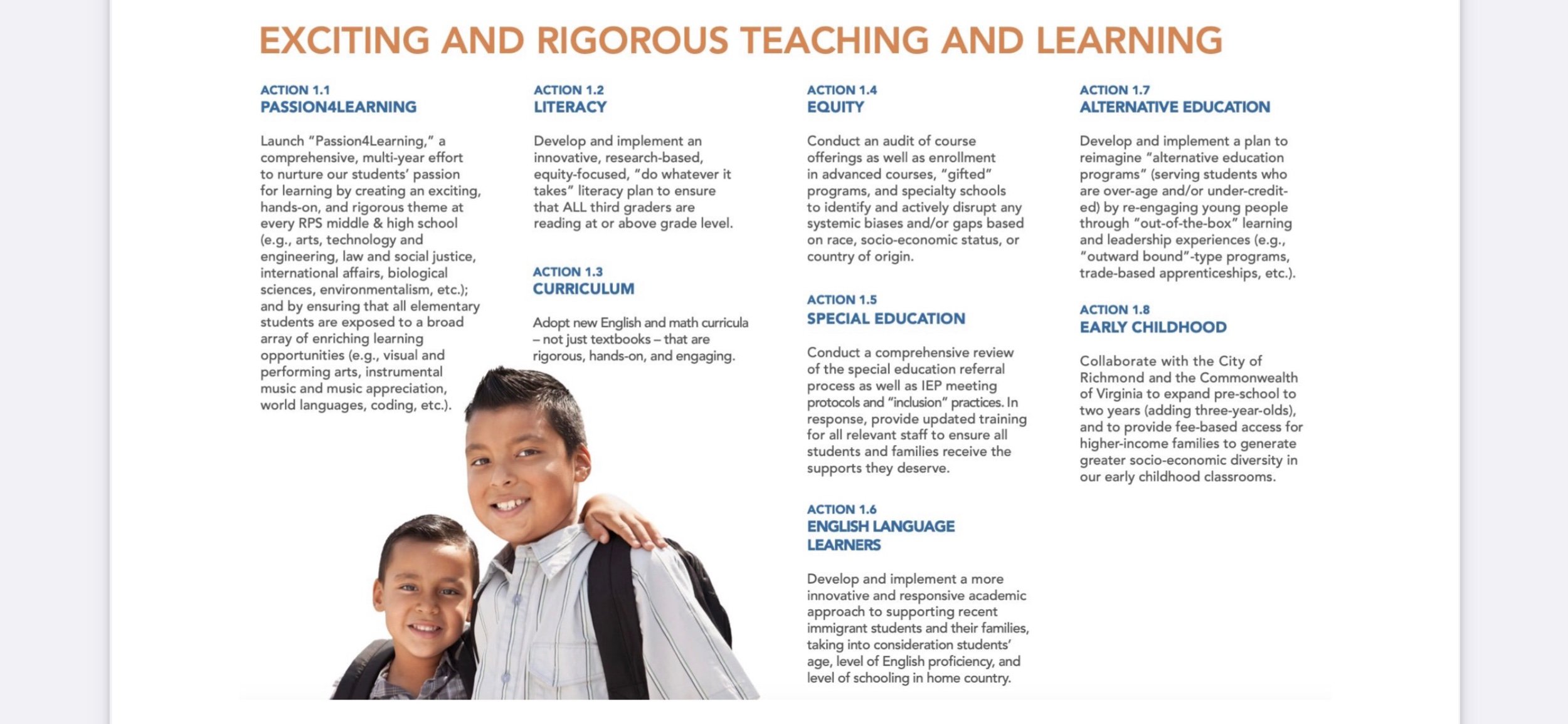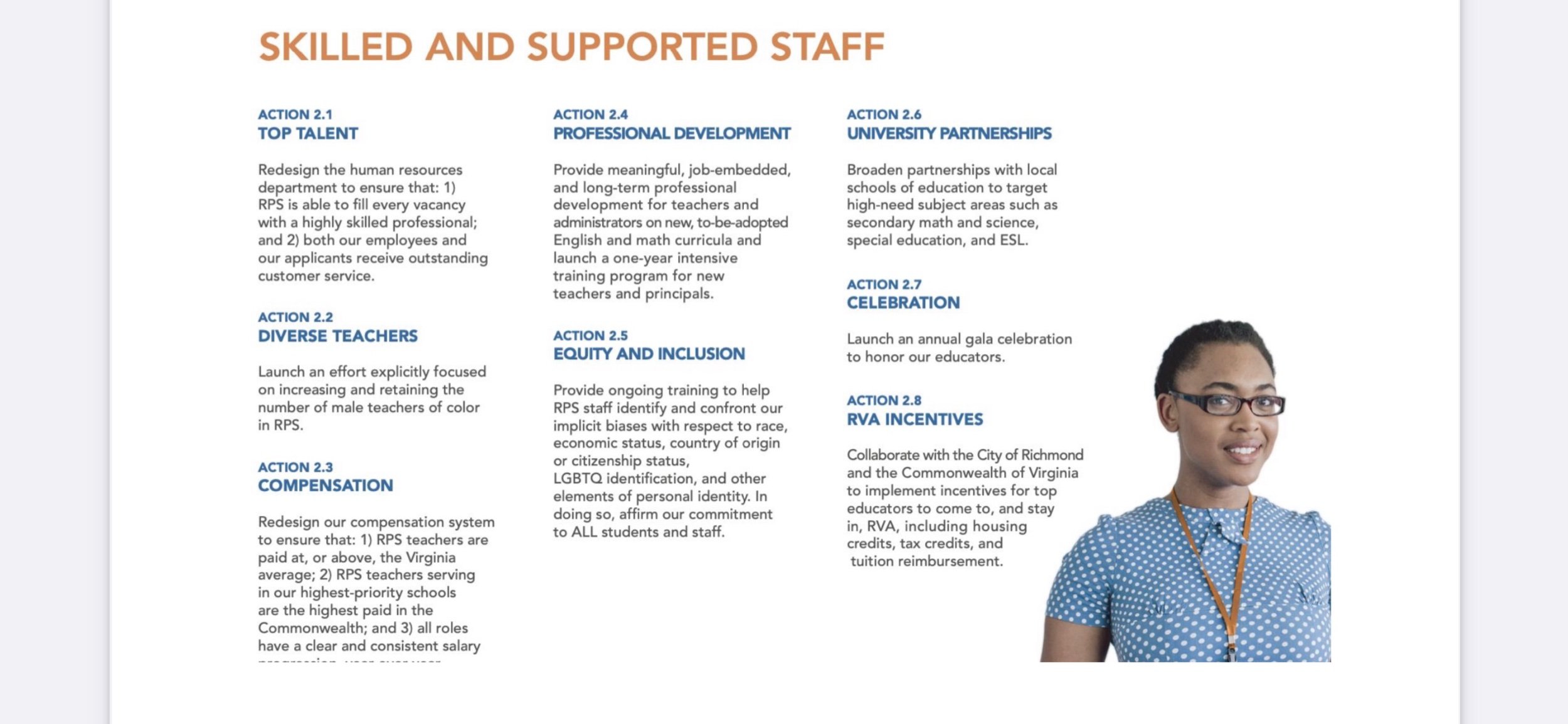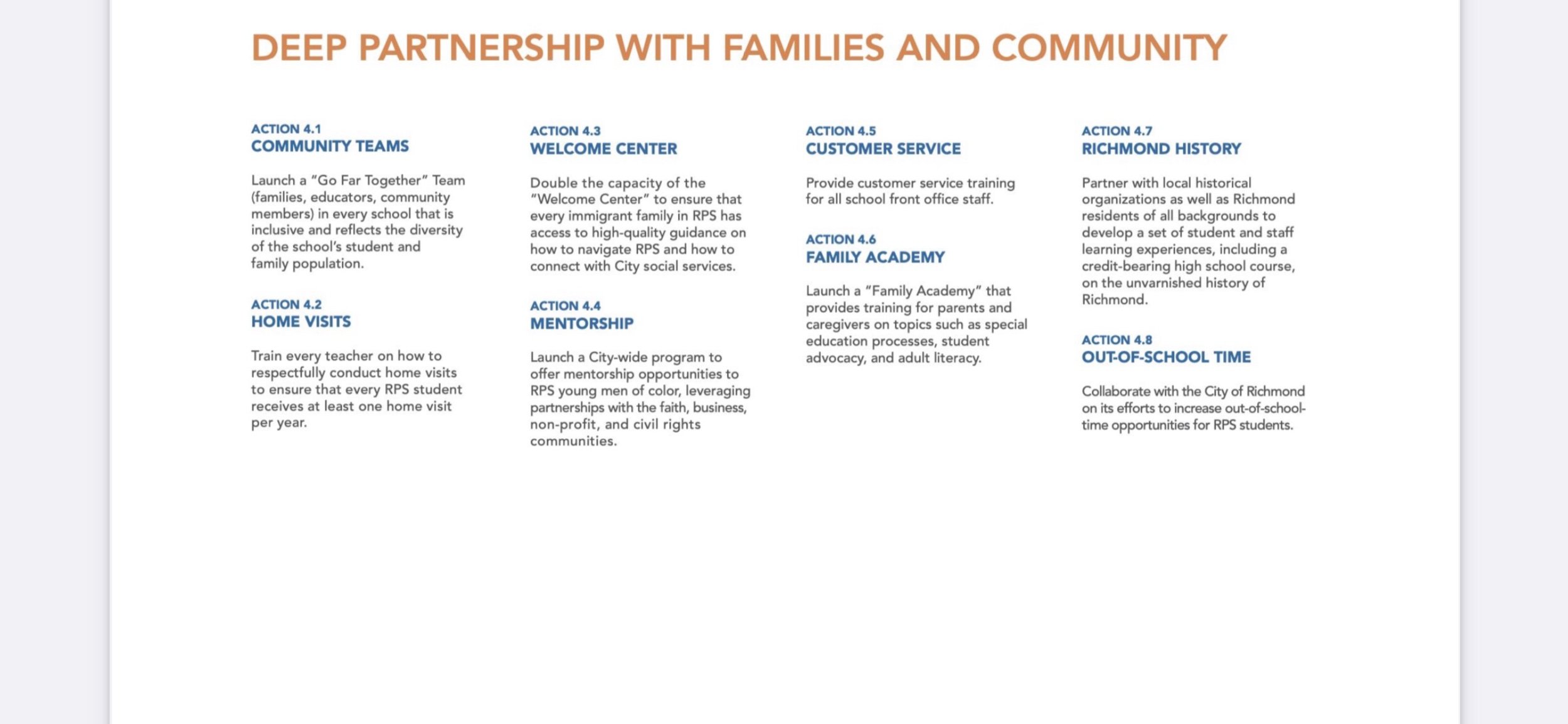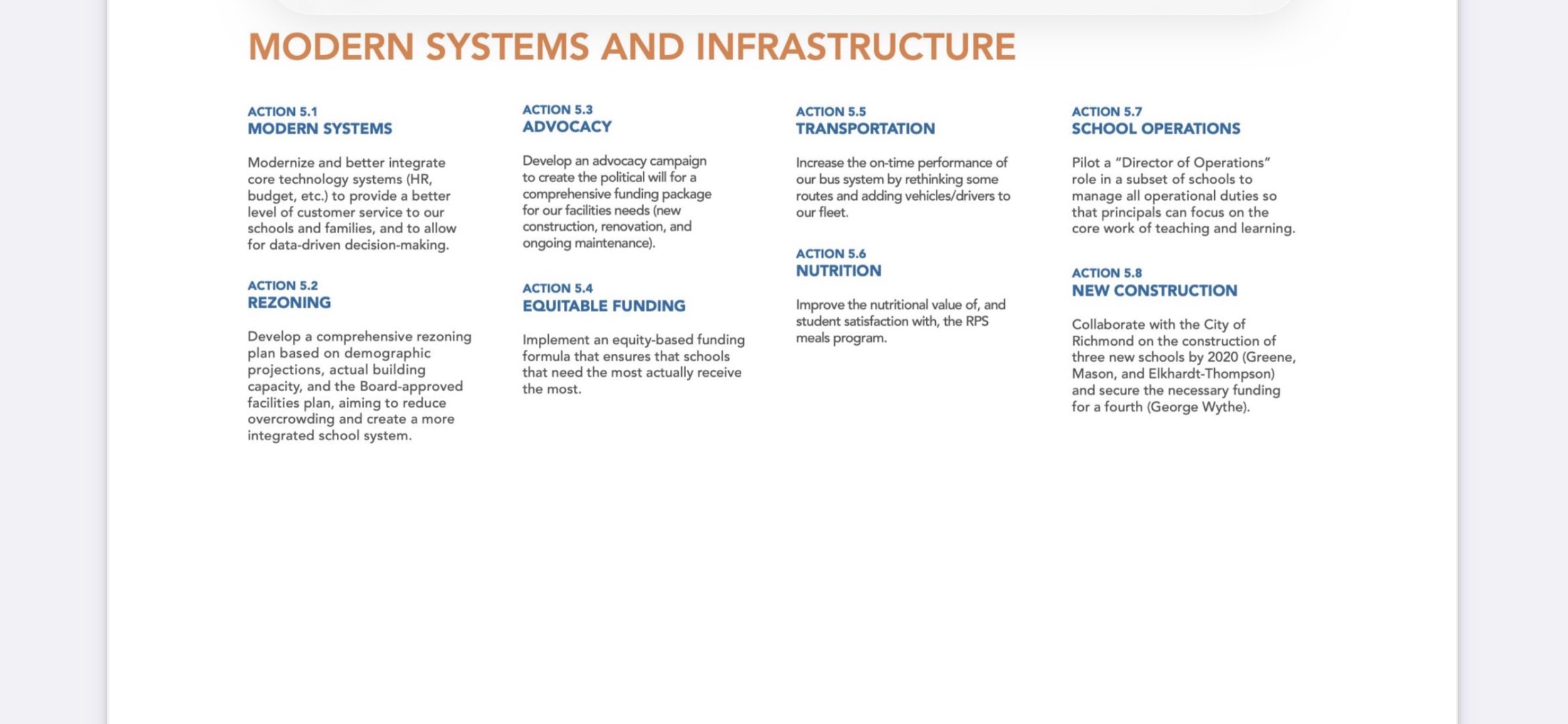RPS RECAP: July 10, 2023
Welcome back, Board Watchers! I carved some time in my rainy weekend to put together the July 10th RPS RECAP.
I cover a bit of everything today - state politics context, historical context, national trends. Ordinarily that might sound like a pretty dry read, but loyal readers know this Board will make all things spicy.
As always, you can read the post all the way through, or scroll to the parts that most interest you. If you enjoy what you read, please consider texting it to a friend or 3, it will go a long way helping me towards my goal of creating more informed voters ahead of the next School Board election. Here we go:
Dreams4RPS 2.0
The Security Grant
Head Start Follow-up
Teacher Turnover
Who’s Job is it Anyway?
Dreams4RPS 2.0
Covid was a real kick in the pants for all school districts around the country; but in RPS - where our students were the last in the state to return to in-person learning - the social and academic impact has been profound.
The goals the division adopted in 2018 (“Dreams4RPS”) are no longer reasonable, nor do they address the problems experienced in a post-pandemic classroom.
The Board agreed to a hard reset of this strategic plan, Dreams4RPS 2.0, which Superintendent Kamras introduces tonight. These new goals fall into 5 buckets:
Exciting and Rigorous Teaching & Learning
Skilled and Supported Staff
Safe and Loving School Cultures
Deep Partnership with Families and Community
Modern Systems and Infrastructure
There’s a lot of outside-of-the-box thinking, here - from creating “Go Far Together” teams (which sound like division-curated PTAs), to restructuring teacher pay to guarantee that teachers in the division’s highest priority schools are the highest paid in the State. There’s also some nuts-and-bolts items on the list, like revamping the HR department to deliver “outstanding customer service.” It’s not the flashiest recommendation in the plan, but it solves a huge problem behind the scenes that often frustrates current teachers and deters new applicants. Browse around at your leisure:
Before this plan is set in motion, the Board and the administration will have to collect feedback and buy-in from the public.
The question before the Board now is “do you approve of the community engagement plan?” (The “so you don’t move the goal post and endlessly criticize me after I’ve done it all” is silent.)
The Board’s feedback varies:
Whatever the engagement plan is, Gibson wants more. At least one meeting at each school.
The engagement plan calls for 2 meetings per school. And a regional meeting in each district. And two community walks in each district. (Page 4)
She encourages the administration to be “honest about both the wins and the losses” out of the original Dream4RPS strategic plan.
The administration agrees. That’s on page 3:
“Conduct an honest assessment of our progress on all 40 actions of the original plan”
Dr Harris-Muhammed reminds Mr Kamras about the community meetings she’s asked him to hold at each school. She wants to discuss the 2021 and 2022 school climate surveys.
That’s also on page 4.
(She’s especially focused on Overby-Sheppard for some reason, even though it scored pretty well in the climate survey.)
Ms White wants the admin to share the engagement materials they intend to use, which don’t exist because the Board hasn’t blessed the plan yet.
Chairwoman Rizzi and Rep Jones want more details on the planned engagements and want to provide feedback of all the locations and engagement strategies used in each district. When Kamras says “I would defer to you all - I would love your thoughts on where you think it would be best to hold [your district meeting] and then we could schedule that accordingly” - Jones tells him you first with a sort of dismissive chuckle. [Watch]
Vice-Chair Burke wants a greater emphasis on CTE and connecting students to the job opportunities that await after graduation.
Page wants to add outreach to alumni.
Gibson wants to add outreach to the teacher’s union.
Doerr suggests hosting a tele-townhall.
So - prepare for all the RPS outreach, y’all. Meetings are a’comin to a community near you.
The Security Grant
Back in May, Governor Youngkin announced a $16.4M competitive grant intended to fund upgrades to schools’ security systems, infrastructure and staff.
Last year’s $12M grant program provided RPS with “$204,480 for Barack Obama Elementary, Chimborazo Elementary, Miles Jones Elementary and Swansboro Elementary.” (Source)
This year, the RPS administration is asking for a $350k slice of the $16.4M pie (grant) to address pressing needs around the district.
They had hoped to avoid using this money for new staff, since the VDOE hasn’t indicated yet if they’ll renew this funding annually, and RPS can’t sustain additional salaries without it. (Unclear grant details are something of a pattern these days.)
But - things like door security are a division priority - so they’re proposing hiring hall and grounds monitors to keep kids in class and supervise exits. (That didn’t stop Rep Gibson from telling Channel 8 News that door security was missing from the administration’s security plan, though.)
Beyond that, this grant is a glorified gift card that the division can use on things like security cameras and background check software.
Free money for schools with the highest need! Just submit an application for your chance to win, then share +$40K of whatever the VDOE gives you with 9 area private schools. (Yes, that’s a real thing we’re doing.)
Chief Wellness Officer, Renesha Parks, needs a quick turnaround. The application has to be Board-approved tonight because the Board doesn’t meet again before the state’s august deadline. Pretty please?
Jones recommends the Board table this vote and discussion until later in the agenda, when they are scheduled to receive a Safety and Security presentation. That’s a more efficient use of time, plus that later presentation may inform their vote on this grant.
Initially, her colleagues sound agreeable.
But they quickly roll into asking questions anyway - most of which were answered in the write-ups the administration loaded to BoardDocs last week.
Dr. H-M also wants to know who is responsible for making sure the division is in compliance with the terms of the Grant, and when can the Board expect updates about it’s impact/effectiveness?
Chief Parks intends to provide a Safety Report (including this grant) at every Board meeting; but, it’s Dr. H-M’s professional opinion that this grant merits its own agenda item.
Page suggests the Board receive a copy of the updates the VDOE already requires.
Vice-Chair Burke enthuses.
Jones jumps in again. She thought they’d agreed to save this discussion for the Security presentation. “We’re going to ask all these questions again!…we just spent 10 minutes on this already.”
She makes a motion to approve the grant application - forcing a vote and steering the Board towards a more productive use of time.
Gibson abstains.
Motion passes.
VPM already released a decent summary of the Security Presentation, so I won’t duplicate those efforts. Just keep in mind our discussion last week about our Goldilocks-Board, and the 2 year habit they’re in of shooting down or ignoring a myriad of safety proposals because.. this evening was more of the same, and the reporter doesn’t mention any of that. They skip over some alarming quotes from a confused Rep White, too.
Head Start Follow-up
When we last heard about the Head Start program, RPS was in deep doo-doo. The local Head Start Office had audited the division’s use of grant funding and found critical compliance concerns. (This wasn’t super surprising, considering recent headlines.) New-ish Chief Academic Officer of Elementary Instruction, Leslie Wiggins, had spent months working with Dr. HM trying to resolve those issues and regain the trust of the Federal Head Start office. (Without it, they’d risk losing that grant funding altogether.)
Hey AI Hulk Hogan, remind us what Head Start is, who it’s meant to help, and what it would mean if RPS lost access to that grant funding?
Well, let me tell ya something, brother! Head Start is a powerful federal program designed to give a leg up to low-income children and families. It's all about providing early education, health services, and family involvement, dude! But if they lost that grant funding, it'd be a major body slam to their operation. Kids could miss out on crucial opportunities, brother, and families might struggle to access those vital services. We gotta fight to keep Head Start in the ring, brother!
Well. Richmond recently had a follow up audit, and - as Ms Wiggins put it - “it was not the result we wanted.” 3 pesky compliance concerns have stuck around. You know - little things, like failing to competitively bid contracts 92% of the time. (Pg 25/222)
Hey AI Mrs. Doubtfire, why might the Feds think that’s a problem?
Oh, my dear, competitive bids make things fair and transparent! It's all about giving vendors a fair chance. Choosing contracts based on merit ensures quality and saves money. Competition stops favoritism and makes people accountable, you see!
Competitive bids are also required by State law - the Virginia Procurement Act - which our Board has their own dubious relationship with. (See: “So Conflicted: Legal Representation”)
Widespread procurement violations were also flagged in a 2018 Audit by the Council of Great City Schools: “The team was told that schools and offices had provided vendors with purchase order numbers before procurement department approval had taken place.” (Pgs 15 & 16)
Anyway. The result of June’s Head Start audit is basically RPS’s 2nd Strike. They are no longer the default provider of Head Start services. They will have to compete with other providers (the city’s Office of Children and Families, perhaps?) for Head Start grant funding next year.
There’s another “monitoring review” in December. If they haven’t resolved their “deficiencies” - Ms Wiggins says - “our program could be terminated.”
That’s a big deal! Strike 3, You’re out.
So tonight, she’s presented a Quality Improvement Plan (QIP) - a playbook for how her team intends to get their Head Start program back in compliance again.
Quick break here to share: none of this means RPS is intentionally defrauding the Office of Head Start, or any other grant provider. Here’s AI Homer Simpson with a quick list of common reasons high-poverty school districts like ours fall out of compliance with complicated federal grants:
There’s all kinds of reasons, like lack of resources and staff, lots of people comin' and goin', language troubles, not enough trainin', complicated paperwork, and not enough time. D'oh!
But hey, they're tryin' to fix it and help the kids, so that's somethin', right? Woo-hoo!
Dr. HM says so, too. “Our partners… are moving in a positive trajectory.” She offers her Kudos to the RPS Head Start team, who “dug in - all the way in - to the bottom of the ocean - to ensure that we could continue to move forward with the services we’re providing to our Head Start families.”
Rep White asks “who is responsible for correcting those deficiencies?”
“It’s me,” Ms Wiggins says. (And the policy council, Head Start team, and the governing board.)
Vice-Chair Burke is worried that the School Board and the Head Start team are “working in silos” - and invites them to give regular updates at Board meetings. “We don’t want to lose this program.”
Chairwoman Rizzi asks to attend Policy Council meetings.
CAO Wiggins would be delighted to do both.
This discussion comes after months of Council’s Education and Human Services committee meetings where the head of the City’s Office of Children and Families has expressed a willingness to help RPS with the Head Start heavy-lift, and donate covid money to their recruitment efforts. The School Board (Dr HM) responded by banning RPS administrators from coordinating with the city in any capacity.
Teacher Turnover
Teacher retention is a national crisis. Period.
Across the country, “this storied career path has seen its fair share of struggles since the Great Recession.”
In Virginia, this is undoubtedly tied to the General Assembly’s 2009 decision to cap the state’s contribution to support staff. Over the course of 10 years, this dropped per-student funding by 8%, largely relying on localities to pick up the tab.
“Lower funding has meant fewer staff assisting an increasing number of students (up 55,000 since 2008-2009). It has meant limited progress on teacher compensation. It has meant kids attend school in buildings almost a century old.” (Source)
Sound familiar? Statewide, teacher’s jobs got harder, their salaries stalled out, and their workplace conditions continued to rot around them. In Richmond, this problem is compounded by the influence of poverty.
“While it’s a widespread problem, teacher turnover is higher under certain conditions and among particular groups. Research suggests that Title I schools—those receiving federal funds for low-income students—see turnover rates that are nearly 50 percent greater than other schools.” (Source)
In these conditions, teachers burn out quicker, only to be replaced by novice (and provisionally licensed) teachers whose inadequate training and mentoring accelerate their own burn-out (and eventual exit) by 25%.
All this screams “policy problem!” to me - one that starts all the way at the top of the political food chain; but our Board explains this trend through a variety of personal failings, instead.
Over the course of the last year, the Board has described and alluded to - what I’ll call - “the Principal problem.” The gist is: School administrators are overbearing and retaliatory. They set their teachers up to fail - forcing them into inappropriate class assignments (subjects or grade levels), bogging them down with menial tasks, and then transferring them to another school when they make too much noise about it all.
In the national context of teacher turnover in high-poverty schools, this sorta makes sense. Why wouldn’t principals develop a habit of treating teachers as though they’re disposable when so many have the shelf life of a banana?
But we also have to consider the source. Board members are hearing all this via “an exorbitant number of emails from teachers” (Gibson) - who “think [the Board] can solve everything, but we can’t solve anything. All we can do is forward [their emails] to Mr. Kamras.” (White)
You can find my obligatory crowing that “that’s a policy violation!” here.
Despite the cultural taboo in saying so - these teachers aren’t always selflessly motivated. Some of them have low expectations of their students, or expect to carry on a decades-old practice of parents and teachers cherry-picking student’s class assignments. (See: New School Names) Others oppose the use of a science-based reading curriculum that requires both “intensive” professional development and abandoning the Lucy Calkins Kool-aid that encourages educators to defy 20-some years of literacy research and their administrators:
“You can say no. And people all over the country are doing so.” Lucy Calkins
For those teachers, a bullying principal may actually just be one who follows the VDOE mandate to “provide explicit expectations to teachers on non-negotiables for instructional practices,” increase professional development, and develop a system to hold teachers accountable for the quality of their instruction.
This is the VDOE’s Academic Review after sitting in on an English class at the same Broad Rock Elementary School the New York Times praises for embracing the new literacy curriculum. I share this to illustrate the diversity in thought (and behavior) of RPS teachers - which, vary from classroom to classroom, despite sharing a roof and an administrator.
All this to say - it’s complicated. More complicated than the Board wants to believe. “Bully principals” is a simple narrative, and every time they see the teacher attrition data, they become more and more convinced.
Teachers aren’t getting their planning periods? Bully Principal!
(But actually, this is the teacher shortage showing up again, like a snake eating its own tail. Teachers who show up are “voluntold” to spend their planning period covering for their peers who are chronically absent or resign mid-year. I digress.)
Rep Gibson doesn’t believe the division can hire their way out of this Principal Problem. “We have to address the leak,” she says, because bullied “teachers are getting pushed out” of RPS. (Principals are, too.)
Rep Jones wants the administration to share data about which of their principals are on performance improvement plans. She also suspects the academic team is contributing somehow, turning up the heat on teachers and school administrators. (Because, they are. It’s the Academic Department’s thankless job to follow and enforce the VDOE’s recommendations.)
Rep Doerr agrees, but says the Board “needs data to support these feelings.” She asks the administration to prepare a teacher-attrition deep dive for a future board meeting.
Vice Chair Burke offers a reality check. Teacher vacancies are concerning, but this problem isn’t new.
“We never had a complete full staff in the 20 years I served as principal… lots of great teachers stay just long enough to get their documents signed off - that they worked in a Title I school - then they’d go to what I call the “country club schools” because, it’s a lot of work - it’s a lot of work.”
She encourages the Board to support the excellent recommendations of the teacher retention task force - which largely promote longevity by increasing teacher support, training, mentorship, and career advancement opportunities. (See: “Listen to Teacher”)
She also questions her colleague’s motives. Why now? “It comes back to haves and have nots” - the vacancies in her East End schools didn’t attract the interest of representatives in the city’s wealthier districts until the problem started to impact their schools, too.
Burke then tells her colleagues to stop pointing fingers - read that again - and makes a show of appreciation to the teachers, instructional assistants, bus drivers (and more) who “love what they do” and are “hanging in there with our children” through this challenging time in education.
Teacher Turnover, Continued: “Who’s job is it anyway?”
“If we are serious” about teacher retention, Dr. Harris-Muhammed says, we’d add teacher exit surveys to every Board Meeting agenda.
Eagle-eyed readers may be noticing a trend, here. Dr. HM and Vice-Chair Burke have already recommended 3 new recurring agenda items for the Head Start grant, Safety & Security, and (separately) the security equipment grant. The teacher retention task force makes 4, and joins existing recurring agenda items like (separate) construction updates for both Fox and Wythe (now the Richmond High School for the Arts). Oh! Don’t forget the presentation on the publicly-available VDOE culture and climate surveys, and publicly-reported changes to the State Board of Education, please.
It’s been a while since I’ve shared the Council of Great City Schools’ Good-Governance Rubric, which - on page 5 - says a student-centered School Board meeting has…
“no more than two Board-authorized public meetings per month and none lasts more than two hours;” and
“schedules no more than three topics for discussion during any Board-authorized public meeting.”
That’s because a student-centered school board doesn’t micromanage division administrators. They trust. They delegate.
By contrast, our Board has “no trust.” They yield nothing. They expect 6 recurring discussion items at every meeting - even though they rarely read the presentations they ask for, don’t trust the presentations they do read. It’s no wonder these meetings routinely drag on past 11 and 12 o’clock.
Our entire Board is guilty of micromanagement.
Even Young, who - outside of a “yay” or “nay” vote, says nothing this whole meeting - but still wastes Board and Admin time playing helicopter-parent with division finances. ICYMI, he recently restricted the Superintendent’s procurement authority more than any other school division in Virginia, so there are double the contracts to review at most meetings. (See: “Procurement Policy”)
Micromanagement is part of the Richmond School Board’s DNA. It’s part of every audit and report I come across, looking back decades.
Take this account of Patricia Conn, RPS Superintendent circa 1995.
“In retrospect, I erred in trying to do too much too fast in Richmond” (Weatherford, 2003, p. 124).
She went on to say that the board micromanaged the system rather than sticking to its mandate of setting policy (Weatherford, 2003)…
The reputation of RPS became one that was difficult to manage, and the school board was viewed as hard to work with.
A former president of the Virginia State Board of Education said, “There’s no doubt that a lack of consistency in that position [of superintendent] has hit the Richmond Public School system very hard” (Weatherford, 2003, p. 122). There were also persistent complaints from inside and outside of the district that favoritism played a role in the hiring practices of RPS, especially in the upper administrative positions (Kollatz, 2002). (Pg 135/252)
There’s a spicy 🌶️ bit on page 140 about the Superintendent firing insubordinate employees, and the School Board retaliating by removing the superintendent’s power to hire/fire/transfer employees. It’s a remarkably relevant report, given our current Board’s interference with personnel - firing principals, reinstating fired staff (see: “Closed Business”), and participating in the “Retaliation!” hysteria of the proposed post-pandemic closure of the Richmond Virtual Academy, and the transfer of its 70-member staff to fill vacant, in-person positions.
The School Board of the 1980’s and 90’s was plagued by micromanagement, and shared or permitted a culture of coddling insubordinate staff. The administration spent more time fighting for the ability to do their job - than actually doing their job. This constant distraction from division management had predictably devastating effects on school safety, student attendance, and accountability at every level.
The report suggests this era was an “aftershock” of the de-stabilizing desegregation efforts from 30 years earlier.
Which, in turn, has informed my current theory: that our current Board’s culture of micromanagement is an aftershock from the 80’s and 90’s, and the hard turn towards authoritarian tactics new leadership adopted in order to bring a wayward division back into compliance with State law (cough, procurement) and academic requirements. In practice, though, preferential hiring meant there was little accountability for all those who turned a blind eye to the liberties that principals and teachers took to advance students who had no business advancing, and graduate students who had no business graduating.
This is the environment that then-Principal Burke came up in.
This is the broken system other Board members navigated as parents.
And it may be the reason our Board now is divided into factions that either want to avoid repeating the mistakes of recent RPS-past, or think micromanagement is and should be the norm, producing headlines like…
Richmond School Board Chair says VDOE has no 'space' to indicate how she governs: 'Like it or not'
The third faction doesn’t get discussed much. They are the desperate moderates who are too tired to interfere either way. In which case, they de facto support Team Micromanagement, and leave them to run roughshod over bullied administrators.
The VDOE has no teeth. They will advise, they will see videos of the Board disparaging them, but ultimately, they will do nothing.
We, the voters, are responsible for holding the Board accountable; informing friends and neighbors so they can do the same; and running to fill School Board seats if our electeds cannot get out of their way and put kids first. We each have a role to play - which is yours?
Alright folks! That’s all the energy I have for this RECAP. I want to close with a message of sincere gratitude and admiration for the Fairfield and Cardinal Elementary school staff, who are preparing to return back to school for their extended-calendar pilot. I am thrilled to hear about your robust engagement efforts, and cannot wait to follow your “R200” journey over the next year. Break a leg!
We’ll be back August 7th with live-tweets from the Huguenot High School auditorium… unless the bird app is officially dead, or we hear from enough of you on Threads asking us to post there, instead. We promise to meet our readers wherever you are.
If you miss us real bad, enjoy bonus school content from this weekend’s groundbreaking of the new RHSA (Wythe!!).
See you next month!

